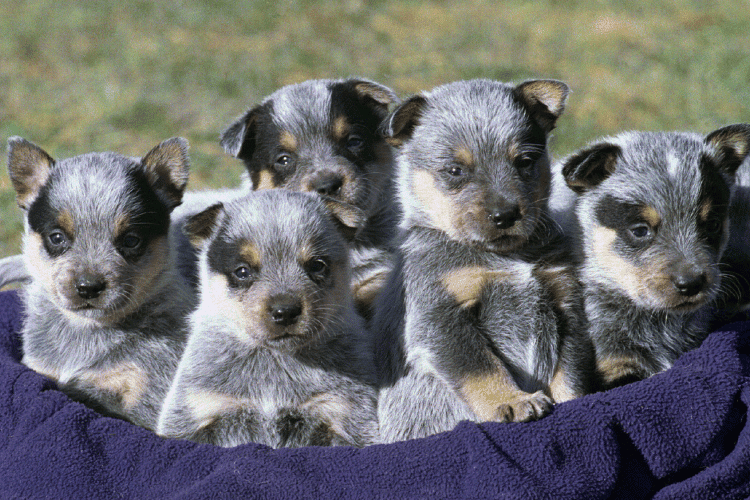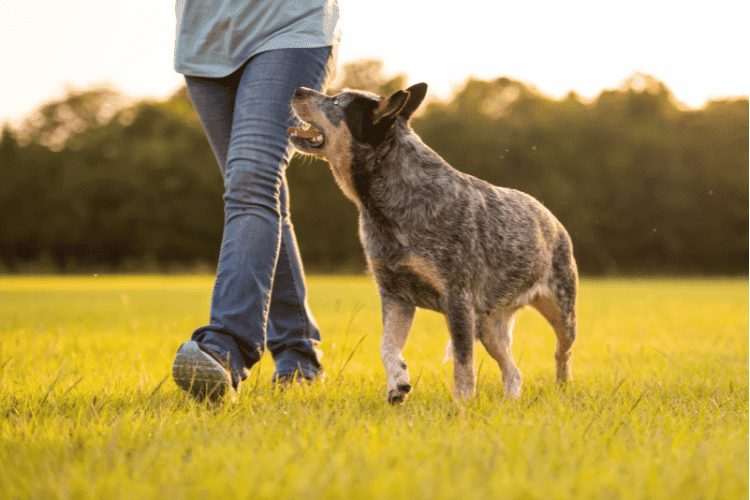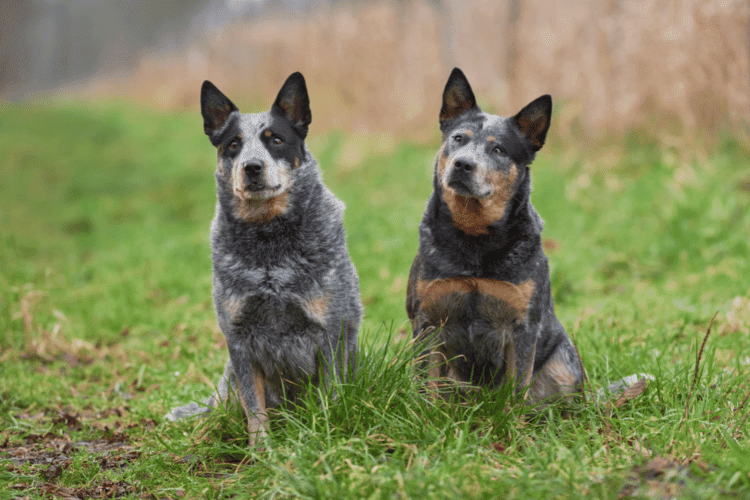The Australian Cattle Dog Catahoula mix is the product of breeding an Australian Cattle Dog (Blue Heeler) with a Catahoula Leopard. This crossbreed also goes by the Catahoula Blue Heeler mix and the Catahoula Cattle Dog.
Unlike their parent breeds, these mixed dogs haven’t earned recognition yet. Nonetheless, they share similar traits with their parents, like a robust body and a high-work drive.

Temperament of the Australian Cattle Dog Catahoula Mix
Factors such as genetics, environment, and training can influence each dog’s temperament.
However, the Australian Cattle Dog Catahoula mix is generally intelligent, loyal, and high-spirited.
Brilliant Watchdogs and Lifelong Protectors
The Catahoula Leopard and Australian Cattle Dog (ACD) are both protective in nature. The first is territorial and adventurous, while the latter is alert and devoted.
This makes their offspring a brilliant watchdog. So, you can expect the mixed pup to patrol his territory and warn you of potential danger.
Loyal, Sweet, and Loving
Just like the parent breeds, the Australian Cattle Dog Catahoula mixes can be very loving around the people they trust. Although they have a tendency to become aggressive, they can still become good pets.
The key is making sure that they grow in a sociable environment with adequate socialization and training.
This way, you can lessen the odds of them being aggressive around kids and household pets when they grow up.
Active and Playful
This mixed breed can be quite active and playful. For this reason, they need plenty of physical and mental exercises.

Aim for at least an hour of playtime every day.
You can also let them join you in your morning exercise routine. This way, they can release extra energy through walking and jogging.
Plus, you can give them some toys and a spacious area to run free. This will keep them engaged and reduce their boredom, especially when you’re not around.
Given their energetic nature, they can be perfect for active owners who love to spend time with their pets outdoors.
Stubborn and Destructive
As interesting as it is to have this mixed breed, they can also be stubborn at times.
When they feel bored, their destructive behavior may kick in. So, you can’t leave them alone for long.
They could also inherit the Blue Heeler’s tendency to bite when threatened. However, with good training, you can inhibit this behavior.
Physical Attributes of the Australian Cattle Dog Catahoula Mix
One Catahoula Cattle Dog may look different from others of the same mixed breed. After all, predicting how genetics will work won’t be easy.
Yet, in general, you can expect the pup to inherit the muscular build from his parents.
Size and Weight
The Catahoula Blue Heeler is a medium to large-sized crossbreed.
The ACD parent usually ranges around 30-35 pounds. Meanwhile, the Catahoula parent can grow to a whopping 50-95 pounds!
So, you can expect the pup to grow to weigh around 40-90 pounds at full maturity.
Coat Color
The mixed pups can be red, blue, black, chocolate, or white. They may also be merle, brindle, or spotted.
Coat Type
The coat of your Australian Cattle Dog Catahoula mix will differ depending on his most prominent genes.
He may have the smooth and short coat of the Catahoula Leopard’s side of the family. Otherwise, he could end up with the water-resistant, double-layered coat of his ACD parent.
Common Health Issues of the Australian Cattle Dog Catahoula Mix
This crossbreed is generally healthy. Yet, they have the potential to inherit some health issues that are common among their parent breeds, including:
- Hip dysplasia
- Elbow dysplasia
- Patella luxation
- Deafness
- Eye diseases (7.8% for Catahoulas and 6.7% for ACDs, according to the OFA’s database)
If you want to make sure that your mixed pooch is in good health, you can run a DNA test. This will give you an idea of the health issues you’ll need to monitor.
For instance, you can check for progressive retinal atrophy (PRA) since it’s common among ACDs.
Care Essentials for the Australian Cattle Dog Catahoula Mix
Owning an Australian Cattle Dog Catahoula mix isn’t particularly challenging. However, there are a few care tips to keep in mind.
Grooming
Australian Cattle Dog Catahoula mix is a low-maintenance breed—thanks to the durable and thin coat.
Daily bathing may not be advisable since this can cause their skin to dry and form dander.
Instead, you can give them a good bath once or twice a month. You’ll still need to use quality pet shampoo and conditioner to help moisturize the dogs’ skin.
Brushing the dogs regularly in the direction of hair growth is another good practice. This way, you can disperse the natural oils along the coat.
You may also want to invest in a de-shedding tool, especially since this breed’s coat can shed extensively.
Since their parents are susceptible to deafness, you should check their ears for wax buildup. After all, the American Kennel Club (AKC) recommends doing this for the Australian Cattle dog.

Food and Diet
Since this crossbreed has a pretty active lifestyle, you should provide them with high-quality food rich in protein.
That said, the food servings per day will depend on each dog’s overall weight, age, and activities. You can consult a veterinarian to check the recommended portions.
Training
Since the mixed breed can be a bit stubborn and aggressive, you’ll have to focus on early training.
All in all, you’ll need to establish your authority and encourage compliance through positive reinforcement.
This shouldn't be much of a hassle since the mixed breed is intelligent. However, letting a professional trainer handle the pups can assure you that they will behave well as they grow.
Acquiring an Australian Cattle Dog Catahoula Mixed Pup
If you’ve grown interested in this unique breed, you can get a pup from a reputable breeder at around $900.
That said, this crossbreed is rather rare. So, you might have difficulty finding one in the first place.
However, you can still contact local shelters and breeders to ask about the mix’s availability.

Paul has been creating content for the dog niche for many years. The information he shares comes his first hand experience growing up in dog lovers household and then owning multiple dog breeds of his own as an adult. Paul enjoys doing the hard research to collect, analyze and present our dogtemperament.com readers with the best answers to their questions.